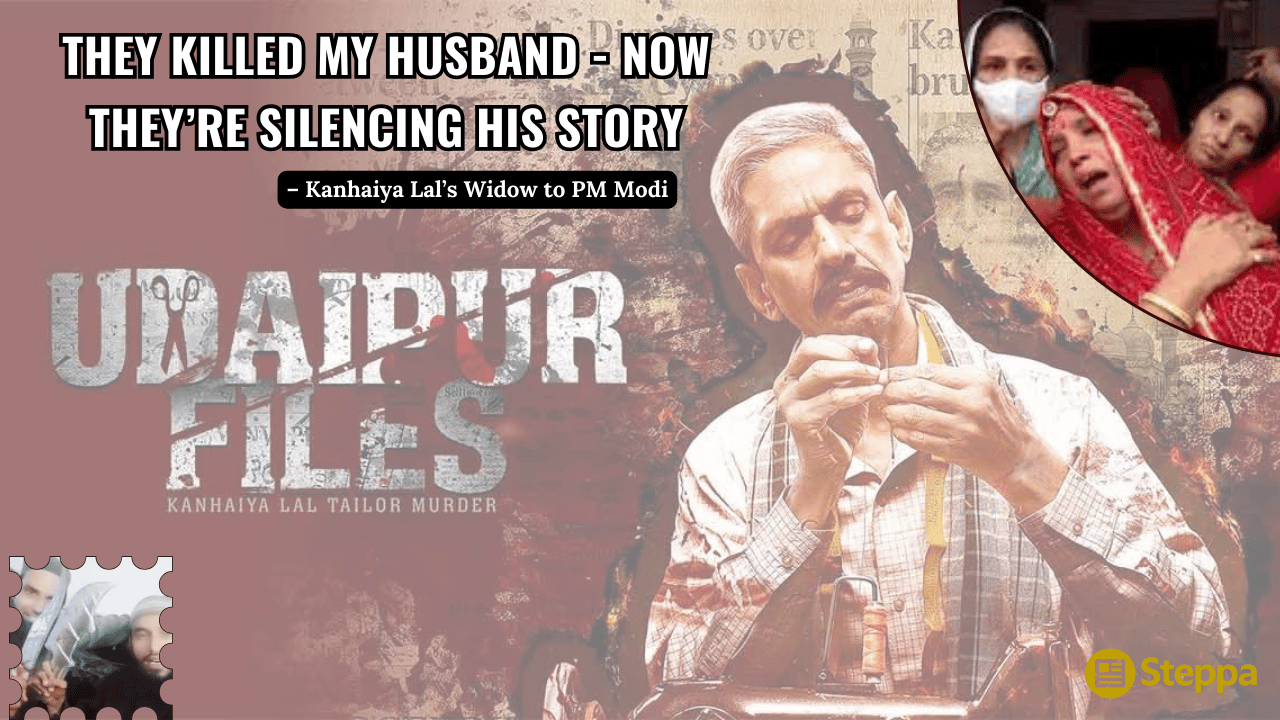A Wife’s Desperate Plea to the PM
Let’s be real—this ain’t your average movie controversy.
Jashoda Teli, widow of slain Udaipur tailor Kanhaiya Lal, has written directly to Prime Minister Narendra Modi, urging him to lift the stay on The Udaipur Files, a film based on her husband’s brutal 2022 murder.
She wrote that “Muslim organisations and their lawyer have stopped the release” through courts, and that she’s already seen the film—calling it simply “the story of his murder.” Her words, as quoted by The Indian Express, are powerful:
“You know the wrong which was done to us. Now those same people who killed him are going to the courts… I request you to get this film released so the world can know the truth.”
Court Pushback, Family Pull
On July 10, just a day before the film’s release, the Delhi High Court temporarily stayed it. The reason: allegations of hate speech and vilification of Muslims, brought forward in a PIL by Maulana Arshad Madani, principal of Darul Uloom Deoband. “Replete with dialogues and instances that could stoke communal sentiments,” the PIL argued, according to LiveLaw.
The bench — Chief Justice D K Upadhyaya and Justice Anish Dayal — directed the petition to the Central government, stating that any challenge must follow the certification review process at the CBFC level.
Meanwhile, Jashoda is in agony:
“Earlier we used to be told that they would be hanged within four months. However, it’s been three years. When will we get justice?” — she said in a video, quoted by The Indian Express.
And she added, “It is necessary for the film to be released so people remember what happened to him.”
The Crime That Shocked a Nation
Let’s not forget the chilling context.
On June 28, 2022, two men—Mohammad Riyaz and Ghouse Mohammad—posed as customers and mercilessly hacked Kanhaiya Lal to death in his Udaipur shop. The cause: a Facebook post supporting suspended BJP spokesperson Nupur Sharma, who had made controversial remarks about Prophet Muhammad.
That act triggered nationwide outrage, debates over free speech, and sparked this film inspired by Lal’s real-life story.
The Flip Side: Fear of Communal Backlash
Critics argue The Udaipur Files could reignite communal tensions. As per LiveLaw, Darul Uloom Deoband’s head pointed out that the film contains dialogues that mirror communal hate speech recently seen in public discourse.
This legal battle over content vs. sensitivity is now heading back to the CBFC level, as per the Delhi HC.
What This Means for Justice and Memory
- For Jashoda: The film is not entertainment—it’s her late husband’s legacy.
- For filmmakers: This raises questions about creative freedom, defamation, and community impact.
- For audiences: It’s a test of whether we’ll let real violence be forgotten or demand acknowledgment.
🔍 Quick Recap Table
| Key Element | Details |
| Who’s Speaking | Jashoda Teli (widow), via Indian Express |
| What She’s Asking | PM Modi to lift court stay allowing film’s release |
| Legal Standing | HC issued stay on July 10; directed issues to CBFC |
| Flaws Raised | Alleged hate speech, communal dialogues (via PIL from Deoband) |
| Historical Context | Lal’s murder over Facebook post in June 2022 |
| Release Status | On hold until CBFC review and government direction |
FAQs About the Controversy
Q1. Who is Jashoda Teli?
She’s the widow of tailor Kanhaiya Lal, seeking to restore his story through film.
Q2. Why was the film stayed?
A PIL claimed it battles communal unity by portraying Muslims negatively—Delhi HC paused its release.
Q3. Did Jashoda watch the film?
Yes. She said she “saw the film”— calling it a factual recounting of her husband’s murder.
Q4. Has the court acted on the PIL?
The Delhi HC asked petitioners to take the issue to CBFC for review, not directly ban the movie.
Q5. What’s Jashoda asking PM Modi to do?
She wants Modi to intervene and expedite the film’s release. She even requested a personal meeting with him and her two kids.
Q6. When was the murder?
June 28, 2022—two men killed Lal in his shop over a Facebook post supporting Nupur Sharma.
Q7. Won’t it revive communal tensions?
Possibly. But advocates say suppressing the film erases the violent act and its aftermath.
Q8. What do filmmakers say?
They haven’t spoken yet publicly—but the CBFC gave the movie a certificate, suggesting it’s within acceptable limits.
Q9. What’s next in the legal battle?
First step: CBFC will revisit the film. Then, it’s up to the government or courts to act.
Q10. Does this impact free speech in India?
Absolutely. It’s now part of a broader debate: “Where’s the balance between free speech and social sensitivity?”
